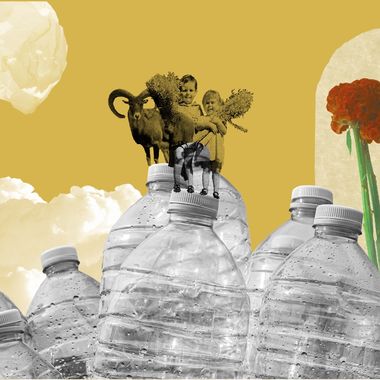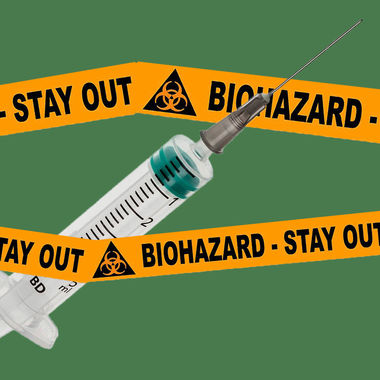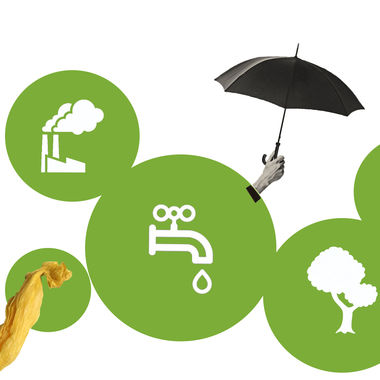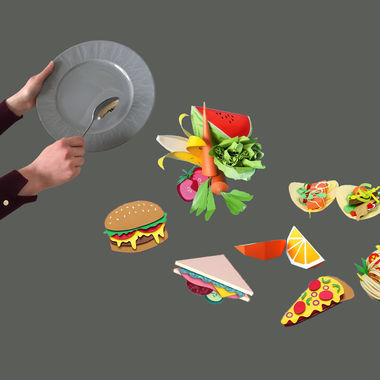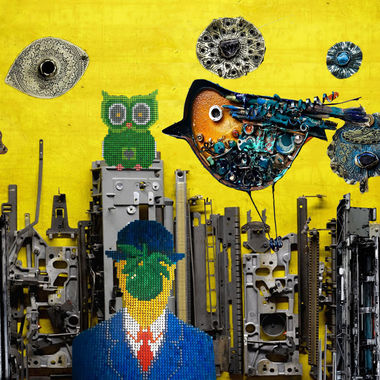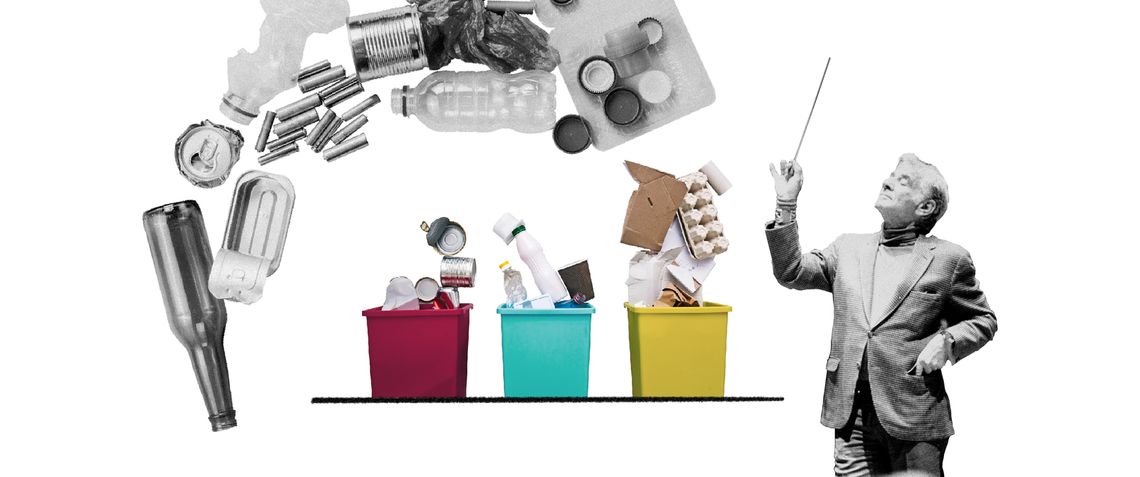
Illustration by Armine Shahbazyan.
Waste management has been one of the most controversial public services for all Armenian Governments. Local authorities both in and beyond Yerevan have failed to provide appropriate services to citizens and have not put in place needed infrastructure. Various reports talk about the horrible state of landfills and dumpsites, fragmented and mediocre efforts at waste sorting and the lack of sustainable business models, including waste prevention mechanisms. Accompanied by a general lack of knowledge both at the state and public levels, these considerable institutional, technological and legislative gaps create a set of obstacles for the development of the sector.
While everyone was busy dealing with the consequences of the 2020 Artsakh War in December, a new set of colorful waste sorting bins appeared in different districts of Yerevan. Is it the start of something new?
The New Waste Management Strategy
Overall, Armenia has a very low level of “waste literacy.” The general Armenian population does not know much about sorting, recycling and reusing waste. Paired with weak municipal waste management programs and services, the sector truly has a multi-dimensional set of problems. The reasons are not only a lack of administrative and financial resources, but the absence of a waste management culture, which cannot be developed in a short period of time. It requires constant work with target audiences, correct messaging and continuous education. All the efforts made so far in waste management and education across Armenia look more like individual, localized, small-scale efforts rather than a centralized coherent policy or strategy.
The Government began actively discussing the new waste collection system strategy in 2020. It features a “two-year program of activities aimed at improving waste collection services in Armenia, enforcing high environmental standards, introducing appropriate mechanisms for waste to be recycled, etc.” The need for this strategy became especially pressing after signing on to the Comprehensive and Enhanced Partnership Agreement (CEPA) with the EU in 2017, as non-compliance became more evident and relevant. In the framework of the strategy, new equipment and bins have already been acquired. But one of its most important points is the construction of two new landfills in Yerevan and in Hrazdan with minimal waste sorting and recycling facilities. Armine Tukhikyan, an expert in sustainable development and environmental protection and Program Director at Urban Foundation NGO, thinks that the government’s approach here is wrong. The waste should be sorted “at the source” and not at the landfill, she explains. In order to avoid large volumes of unsorted waste accumulating in those landfills, the government should focus on the two biggest streams of recyclable waste, which are organic household waste and plastic, rather than invent multiple small-scale mechanisms for all streams.
The AUA Acopian Center for the Environment published a report in March 2020 about waste governance in Armenia, stating that the country’s waste collection and disposal services, as well as landfills, are all sub-standard. They don’t have the minimal required conditions, including gates and proper operation system. The landfills contain vast amounts of self-igniting materials and combustible materials, which creates a risk of fires. However, special smoking zones are barely existing in those landfills. Without clearly defined borders and fencing of a landfill, the waste spreads all around the landfill area because of wind and animals and pollutes the surrounding environment. Without any fences, even animals can access those landfills, which “contain not only large amounts of combustible material but also chemicals, oil and methane gas that can self-ignite.” Thus, toxins spread across the food chain and eventually reach us humans.
Besides landfills and waste sorting, waste prevention mechanisms are another important aspect of successful waste management. The research states that, as of 2019, Armenia had “no waste prevention programs either at the national or local levels.” Luckily, obligations under CEPA by 2022 regarding waste prevention are driving appropriate legal and administrative reforms. According to Tukhikyan, the Ministry of Territorial Administration and Infrastructure is working on the concept of “responsible business” with some partners, which would encourage and persuade Armenian businesses to adopt waste recycling or waste preventive business models based on beneficial economic calculations.
It is noteworthy that, according to UNDP, around 6,000 tons of plastic recyclable waste is generated annually in Armenia. Instead of being a source of the problem, it can also become a source of income and jobs, if managed strategically. That volume of waste can bring up to $5-6 million in income for municipalities, national parks and partner companies, creating 10-15 jobs in the sector for every 1,000 tons of waste. There is a huge need to improve the institutional and legislative framework of the waste collection system, however, to get there.
The Role of NGOs
The NGO sector has had a huge role in bringing waste management culture to Armenia when no state institutions were working on it. Around 10 years ago, based on an international benchmark, one of the first waste sorting programs was realized in Alaverdi with a small grant given to Urban Foundation. The main focus was plastic waste, as it is the second biggest source of recyclable waste in Armenia. A model framework was created focusing on three dimensions:
1-collaboration with local governance bodies as waste management is their direct responsibility
2-creation of infrastructure including the placement of waste sorting bins
3-development of a public education and awareness campaign about waste sorting and its environmental impact for different audiences, including waste collection staff, children in schools and households
After the successful case in Alaverdi, the same model was used in 30 different communities across the country. The sorted plastic waste was given to the municipal government, which could sell it at a small profit. Urban Foundation also allocated special waste balers to maximize transportation capacity and minimize costs.
In 2019, with the support of the EU and after three years of work, a waste recycling factory was founded in Kapan, which transformed plastic waste into six different kinds of building materials. The foundation plans to engage in plastic waste recycling across the whole territory of Armenia. They are also planning to start another experimental project to compost the organic waste from Vanadzor, Gyumri and their nearby villages, transforming it into fertilizer.
Tukhikyan thinks that municipal governments across Armenia need to be supported in their waste management efforts. She mentions that it has always been easier to work in smaller towns than in Yerevan. Although the NGO sector has made efforts to collaborate with the Yerevan Municipality, proposing joint projects based on their models, “lessons learned” or other capacity building activities, the collaboration never took place. Tukhikyan believes that longer-term education campaigns will provide better results than short-term projects. For example, training a core of school teachers who will then train other teachers (a “training of trainers” model) can have a great multiplier effect.
She also thinks that the role of well-thought communication is primordial to the success of any similar project: “Every time you enter a new community, you need to define your audience and you need to make sure any messaging has local ownership. Working with women also should be at the center of attention because, in Armenia, household waste management is mainly done by them. Additionally, it’s great to involve the community in the whole process.” For example, when installing the new plastic bins in various communities, Urban Foundation preferred to involve local children as volunteers to distribute informative flyers and booklets to the residents, thus targeting two audiences simultaneously.
Another great initiative was implemented in 2019 by SmartApaga LLC. Inhabitants of Yerevan are now able to sign up to their recyclable waste pickup service from their homes and offices to receive reward coins, which can be exchanged for bonuses, discounts and even free gifts from their partners.
To conclude, the NGO sector has done substantial work in waste management and sorting initiatives, being a true pioneer and including various communities outside Yerevan. There are many great initiatives undertaken both by international and local organizations, but they all share a common problem: they lack coordination, scale and prioritization of needs, as well as an understanding of the local population and their habits. A complex solution needs to be proposed by the state that unites all the important stakeholders toward a common goal.
The State Steps In
Waste sorting practices arrived in smaller Armenian towns earlier than in the capital Yerevan. The biggest credit for that should be given to the non-governmental sector.
Waste sorting in Yerevan started three years ago. Initially, the main actors were NGOs. The Yerevan Municipality adopted a decision on December 16, 2019, according to which a new community non-profit organization called “Landscaping and Environmental Protection” was created, with a special Waste Sorting Department. The goal of the department is to introduce to Armenian citizens the culture of waste sorting at home and the use of the special sorting bins. The department also aims to educate citizens on the whole chain of waste management, from sorting to recycling.
The colorful waste sorting bins are currently installed in eight out of the 12 administrative districts of Yerevan, with 60 sorting points. By the end of February 2021, Yerevan will have a total of 130-135 sorting points, each with three bins for paper & cardboard (yellow bins), glass (gray or black bins) and plastic (blue bins). At later stages, a fourth type of sorting bin will be added for textile waste. While there have already been some sorting bins installed in Yerevan by NGOs interested in environment and sustainability, now our residents have the opportunity to dispose their waste in their courtyards, without additional complications.
The waste that is being collected from all 60 points with a special vehicle is sent over to private organizations for recycling and is thus diverted from the municipal landfill. It’s worth noting that only private companies are engaged in waste recycling in Armenia, but slow steps are being made toward developing state infrastructure. The head of the Waste Sorting Department, Hayk Hovhannisyan, says that waste sorting and recycling resolves both environmental and economic problems.
I asked many of my friends and neighbors whether they were using the new sorting bins and many of them were not even aware that they had been installed in Yerevan. Some saw them, but didn’t know what they were for. As expected, a failure in communication led to the situation where, in some places, those new bins have been filled with mixed waste.
The Yerevan Municipality assured me that they had planned to start a wide six-week awareness-raising media campaign on October 1, 2020, followed by the installation of the new bins. The 2020 Artsakh War delayed this process as communicating waste sorting at a time of crisis would have been received poorly. However, due to the obligations to the program partner organizations, the placement of the bins had to be completed by the municipality. The media campaign, nevertheless, is set to start soon. Separate educational projects are being developed and incorporated in pre-school and school programs.
It’s too soon to evaluate the success of this new strategy and initiatives, but Hovhannisyan says that the societal feedback has been very positive, even better than expected. That is proof that the new culture of waste sorting and management has been long overdue in our country. Next steps should include further infrastructure development, bringing landfills up to code, closing institutional and legislative gaps, and continued education of the public.
also read
Armenia’s Environmental Security
By Irina Ghaplanyan , Erik Grigoryan
Armenia has an incredible potential to tap into its natural resources sustainably and moreover ensure green economic growth. What is needed is visionary thinking as well as effective, professional and technocratic governance.
Where Does Armenia’s Medical Waste Go?
By Lusine Sargsyan
What is medical waste and how should it be treated? Because of the cost involved in proper treatment, it is possible that potentially biohazardous waste is ending up in municipal dumps.
The European Green Deal and Its Implications for Armenia
By Anna Barseghyan
The European Green Deal is an ambitious plan to make Europe the first climate-neutral continent by 2050. Anna Barseghyan looks at the challenges and opportunities for green policy in Armenia.
Who is Educating Armenia’s Youth About the Environment?
By Gayane Ghazaryan
With no comprehensive environmental curriculum in Armenian schools, individual teachers and NGOs have taken it upon themselves to educate the youth about pressing environmental issues from climate change to recycling.
How to Respect, Not Waste, Food
By Kushane Chobanyan
Food waste is a serious global issue. Roughly one third of the food produced globally gets lost or wasted. In fact, most of it ends up in a landfill. What is Armenia doing to tackle this issue?
Armenian Recycled Art: Imagine There’s No Garbage
By Kushane Chobanyan
Armenia produces a lot of garbage. Innovative artists throughout the country are taking that waste and turning it into art.
Podcasts
Armenia has a waste management crisis. Harutyun Alpetyan, the lead expert for the AUA Acopian Center for the Environment’s Waste Governance in Armenia program, spoke to EVN Report about the development of a national solid waste governance policy, strategy and roadmap based on the principles of a circular economy.
Haik Kazarian, co-CEO and CMO of Smart Apaga, a private waste management service is filling a need in Yerevan - collecting and delivering plastic, paper and glass waste to a number of private recycling companies looking for recyclable material. Over 1000 households and organizations are currently using the services of Smart Apaga, which is also set to launch an app to ensure an even better customer experience and benefits.


